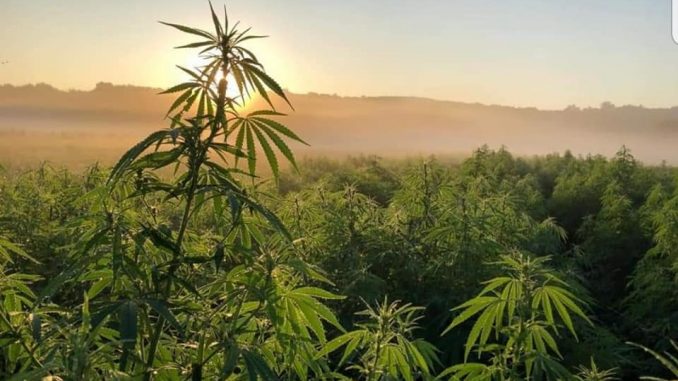
The people’s plant is back. It’s not going away, and the Hudson Valley farmers are certainly not going to be excluded from this.
Gail Hepworth and her sister, Amy, own and operate Hepworth Farms in Milton, a 550-acre, seventh-generation family farm. As well as cultivating more than 300 varieties of vegetables, the sisters are now growing hemp.
“The Hemp Farming Act,” included in the 2018 Farm Bill, removed hemp from the category of a controlled substance and established it as an agricultural commodity. Now that federal prohibition on hemp farming has ceased, the door to new opportunities has opened for Hudson Valley farmers.
“The cannabis plant is an inevitable reality,” Gail said. “It would be remiss of us as professional agricultural people to ignore the potential.”
Earlier this year, the Hepworth sisters co-founded “Hempire State Growers Hudson Valley” in an attempt to safeguard the interests of local farmers growing hemp.
“We’re here to establish the Hudson Valley as a CBD growing region for farmers, for food production and for the agricultural landscape that already exists,” Gail claimed.
Because hemp plants contain cannabidiol, otherwise known as CBD, the resin from the hemp plants’ stalks can be extracted and combined with coconut or olive oil to create a natural form of pain relief. Without THC—the substance in marijuana plants that gets a person high—CBD is both non-addictive and non-psychoactive, and has the ability to foster good health and wellness without altering a person’s perceptions.
Scientific studies reveal that CBD oil is helpful in reducing the symptoms of a wide variety of conditions, including anxiety, sleep paralysis, high blood pressure and even side-effects associated with cancer treatments.
Amy seized the opportunity to capitalize on the economic trajectory of this plant and support local farmers through this market. Currently there are more than 30 local farmers involved in Hempire State Growers, and additional farmers are expected to join by next year.
“There aren’t that many regions that are futuristically viable as the Hudson Valley,” Gail said. “We might be one of the last regions standing, so we have to do all that we can to preserve agriculture here in the Hudson Valley. We would be remiss if we didn’t take this new crop, which is actually an old crop, and integrate it into our farm.”
In the 1930s, hemp was on its way to become a billion-dollar industry, with Henry Ford being one of its most notable advocates. However, when the Marijuana Tax Act was passed in 1937, it levied a high tax on anyone involved in commercial cannabis, nearly destroying the American hemp industry. It is believed that notable businessmen like Andrew Mellon, Randolph Hearst and the DuPont family lobbied against hemp to protect and further their own economic interests in the timber, paper and synthetic fiber industries.
One of Hempire State Growers’ biggest concerns is that the capitalistic mindset of corporations could undermine local farmers’ interests and well-being.
“The challenge is that this could be business as usual. Big businesses are taking over farm land because they see the potential, and it has nothing to do with farming, it has nothing to do with agriculture, it has to do with people making a lot of money,” Gail said. “The farmers who have been struggling will probably pay the ticket and say ‘here you go.’ They will sell out because there is no alternative.”
Over the course of history, limited and inequitable income from vegetable, fruit and field crop farming in New York State has left many farmers vulnerable to low production, insolvency, or even worse, forced into selling their farms.
“Hudson Valley farmers have not traditionally had a profit-sharing mechanism to help them benefit from economies of scale, leverage their efforts against more profitable businesses within the supply chain, and ultimately bolster their competitiveness and economic viability,” according to the Hempire State Growers’ website. “Our bottom-up approach to vertical integration in hemp production and processing, allows for profit-sharing from seed to sale. We see the new hemp industry as an opportunity to ensure the economic viability of the farms in our region.”
Despite the group’s name, growing hemp is not their main prerogative. It’s survival.
“We’re only growing [hemp] because we want to stay in the business of growing fruits and vegetables and grain crops,” Gail stated. “We are farmers; we’re not trying to be hemp farmers. We’re trying to keep farmers farming.”
A top priority for Hempire State Growers is education, for there is a lack of knowledge surrounding hemp plants.
“Because people don’t understand what this crop is, we do have a security threat,” Gail testified. “People see this crop and think it’s marijuana. We have security measures in place that we’ve never had to have because it’s not the same thing as tomatoes or apples. We have to educate people because people don’t understand what this crop is.”
For the 2019 harvest season, Hempire State Growers has over 1,000 acres of hemp planted for field production. To keep this market lucrative for the regional farmers involved, it must be an all hands on deck effort.
“We actually don’t know where everything is going to land. There are risks involved. Farmers going alone will not be a long-term solution,” Gail said. “We need to work together to create something that is different, different from what we have experienced, different from what is the status quo. We’re looking for this to be a once in a lifetime differentiator and it involves growing a high quality plant.”

